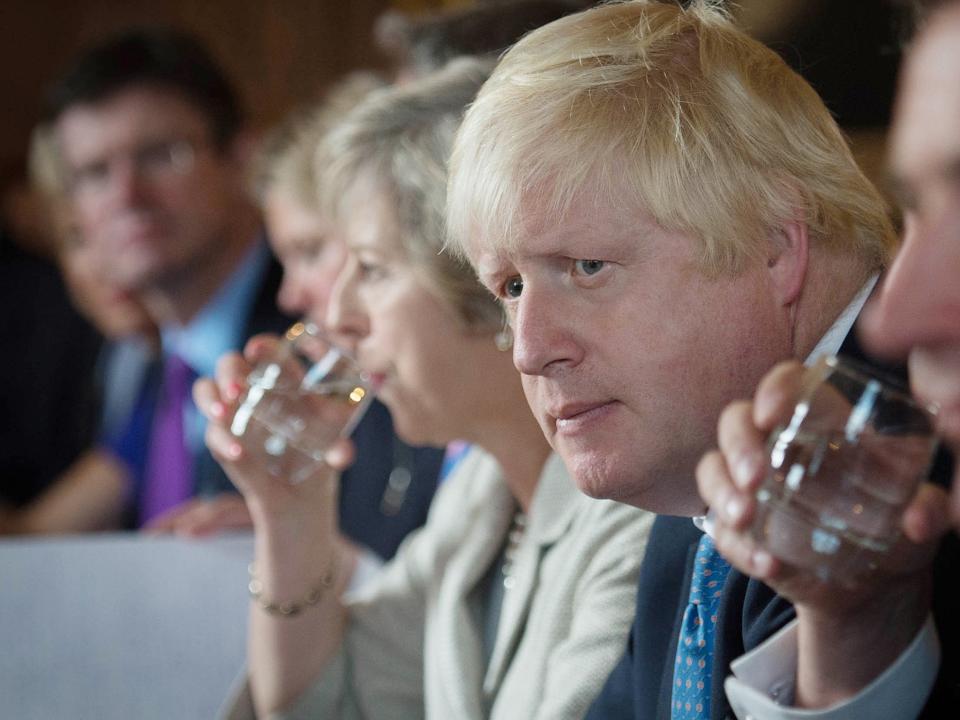Boris Johnson says he is prepared to resign over the customs union – and this time he might actually go through with it
Is Boris Johnson reaching the end of his tether? He has clashed with Theresa May at two recent cabinet meetings. Last month, he called for greater use of stop and search powers to combat violent crime and yesterday he proposed an amnesty for Caribbean migrants following the Windrush scandal.
Yet the biggest battle between the prime minister and foreign secretary is about to begin. May would not lose too much sleep if MPs vote to keep the UK in a customs union with the EU after Brexit. She can’t say that in public: she has to keep hardline Brexiteers on board by repeating her opposition to such an arrangement (though they smell a rat and don’t entirely trust her).
If pro-European Tories stick to their guns, they can defeat the government next month when the commons votes on a customs union. The numbers are the same as last December, when 11 of this group joined forces with opposition parties to win a meaningful parliamentary vote this autumn on May’s Brexit deal.
A repeat of that would have a thick silver lining for May. She could tell the Eurosceptics: “I have tried my best, but parliament has taken a different view.” (Subliminal message: you lot wanted Brexit so that parliament could take back control, didn’t you?) Some pro-EU cabinet ministers hope that MPs will assert their right to shape the EU deal. May might call it a customs “agreement” rather than “union”, but it would be similar to current arrangements.
A customs union would be welcomed by business. It would cushion the economy in a way that banking on possibly mythical trade deals with non-EU countries would not. It would unblock the EU negotiations and, crucially, go a long way to solving the intractable problem of the Irish border.
But if May were to grasp these benefits, she would alienate the hardline Brexiteers in her cabinet and on the Tory backbenches. Ominously, Johnson would lead the charge. Allies say he would “go nuclear” – in other words, he would threaten to resign unless May backed down. We have heard this before. But this time it might really happen.
Customs is a crunch issue because it will define what kind of Brexit we end up with. A customs union would soften the edges of May’s hard Brexit. The Eurosceptics have caved in after May’s previous compromises – such as the divorce bill and a standstill transitional phase until December 2020 – because these had short-term consequences. A customs union would be permanent, and limit the UK’s ability to strike trade deals with the rest of the world – which might persuade Liam Fox, the international trade secretary, to walk out along with Boris.
Backbench Brexiteers are adamant that customs is one red line they will not allow May to cross. Like Boris, they are in the threats business and warning (again) that they will oust her if she accepts a customs union. It may prove an empty threat. There is no guarantee they would persuade a majority of Tory MPs to oppose May in the vote of confidence needed to trigger a leadership contest. Even if they deposed her, that would not necessarily prevent a customs union, since the parliamentary arithmetic would be unchanged.
These are reasons why the pro-EU Tories should stand firm when they come under enormous pressure from party whips to back down in next month’s votes on a customs union. They will be accused of trying to block Brexit – not true, since they accept the UK will leave the EU next March. They will be branded traitors, and told they risk installing a Marxist Labour leader in Downing Street. Another empty threat, since even if May departed, the Fixed-Term Parliaments Act would make an early general election highly unlikely. By standing their ground, the pro-EU Tories would be putting country before party, and softening the impact of Brexit on the economy.
They should do so, and May should join them. No 10 remains remarkably relaxed about this steam train careering towards it. May aides point out that previous predictions of a crash – before the stage one deal in December and the transitional agreement last month – proved wrong. Indeed, May has confounded her critics by keeping the EU talks on track, her party in one piece and preventing cabinet resignations over Brexit. She may try to find a compromise on customs that maintains that record. But it will be a very difficult issue to fudge, both for her party and the EU. May will again try not to take sides in her party’s civil war. But this time, events may force her to finally come off the fence.

 Yahoo News
Yahoo News 

